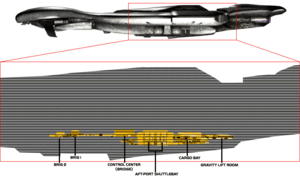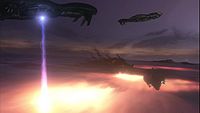Ket-pattern battlecruiser: Difference between revisions
From Halopedia, the Halo wiki
No edit summary |
|||
| Line 41: | Line 41: | ||
*[[Banshee]]s | *[[Banshee]]s | ||
*[[Wraith]]s | *[[Wraith]]s | ||
*8 [[Spirit]]s or [[Phantom]]s | *8 [[Spirit]]s or [[Phantom]]s | ||
*[[Seraph]]s | |||
|crew=[[Elite]]s, [[Brute]]s, [[Grunts]] and [[Jackal]]s | |crew=[[Elite]]s, [[Brute]]s, [[Grunts]] and [[Jackal]]s | ||
|skeleton= | |skeleton= | ||
Revision as of 15:30, January 23, 2009
The CCS-class Battlecruiser is a heavy warship used by the Covenant navy, one of several different designs of capital ships they employ. They are smaller than the rarer and more powerful Assault Carriers, but larger than the more common Frigates and Destroyers, equipped with the standard energy shield generators, pulse laser turrets, and plasma torpedo launchers, and used as a main heavy warship by both Covenant Loyalists and Separatists. They are the most commonly seen, and therefore best-known, Covenant ship classes in the Halo games.
Internal Systems
The CCS classification is the most well known type of Covenant warship, one of the few which the UNSC has been able to gain decent intelligence from, via the Truth and Reconciliation in particular. It appears to be capable of both space warfare and supporting ground operations, capable of deploying upwards of a thousand troops of various races, as well as support vehicles and aircraft through its grav lift.
Differences
Halo: Combat Evolved
Battlecruisers seem to be a deeper shade of purple, and do not have the pointed fins on the nose of the ship. The gravity lifts are a deeper shade of green than blue, and the shuttle bays seem to take up a greater portion of the ship, though this would be probably to accommodate the large portion of cutscenes that transition from the interior to the exterior through this area. Also, the ships need flat areas to dispatch troops. Although it is possible to use the gravity lift on rocks, a flat metal section is preferred.
The only cruiser seen in Halo: Combat Evolved had been disabled. Although, in the books several ships were mentioned.
Halo 2
The ships have a longer, shinier, purple appearance. They seem to have more partings in the purple plates, although this may be due only to the updated graphics. The shuttle bays are narrower and less long, also, the human shuttle bays on the Cairo seem to be based off the bays of The Truth and Reconciliation, although this may only be a similarity on Bungie's part.
Halo 3
Not much different from Halo 2, however, they now have an extra plate on the midsection in between the belly and the right wing. However, we never see the gravity lift up close so it is impossible to tell what changes have been made.
Specifications
Control Room
The Control Room of a CCS classification, known as the "bridge" in human terminology, is located, as with on all Covenant starships, at the midsection of the battlecruiser, protected by thick armor in addition to its shields. A raised platform in the center of the spacious room ringed with holographic controls is the Combat Information Center, or CIC, of the Control Room. These controls are most likely for fire control, navigation, sensors, ship diagnostics, internal security monitors, etc. In front of the command center is a large holographic "banner" which is used for navigation purposes. The crew in the control room usually consists of a Sangheili/Jiralhanae Ship Master who stands on the central platform and is in charge of giving orders and commanding his vessel, accompanied by, in most cases, Sangheili Zealots, or high-ranking captain Jiralhanae that patrol the lower level of the control room, who are responsible for maintaining the security of the ship.
Gravity Lift
Like most warships in the Covenant fleet, the CCS-class is also equipped with a single ventrally-mounted gravity lift, enabling the quick and easy transportation of personnel, vehicles, equipment and supplies to a planet's surface. Objects or personnel placed in it are propelled upward or downward rapidly by an anti-gravity field, and are able to gently disembark, despite the high speeds occupants can reach.[2]
Brig
The CCS classification has at least two brigs for holding prisoners, though they may have more since these ships have not been fully explored. Each is a rectangular room with four forcefield-secured cells on either side, for a total of eight per brig. Each cell can accommodate a large number of prisoners, although normally only one is placed in each cell, probably for security purposes against the possibility of an organized escape attempt. The fields are impenetrable to all hand held weaponry, projectile or energy, but can be lowered by a holographic control panel on a raised platform on the far side of the brig opposite the entrance, the guards post. The cells are arranged at the periphery of a spacious room, with guards patrolling the central section. The guards usually have active camouflage, using their stealth to monitor the prisoners.
Hangar Bays
- Main article: Shuttle Bay
There are at least four hangar bays aboard the CCS classification - two to starboard and two to port side. They are each three-tiered, with a large amount of space between the floors and ceilings of each level. Each bay contains various vehicles, such as 1Spirit-class dropship, on the bottom floor, with a pillar-like platform used for dismounting passengers rising up and connecting to the second level. Covenant troops are arrayed upon the second and third floors, with multiple stationary plasma shields and Shade infantry plasma turrets.[3]
A plasma magnetic containment field operates at the mouth of the hangars, retaining atmosphere while in space transit. It denies the movement of all forms of matter attempting to enter or leave the shuttle bays.
Corridors
Most of the ship is comprised of labyrinth network of corridors, with circuitry concealed behind purple metal casings. At junctions, gaps in the ceiling and floor appear to accommodate Huragok maintenance personnel, allowing them to float between levels easily and quickly.
Doors
There are various, virtually indestructible doors upon the CCS classification. Unlocked ones are outlined in white light, while locked ones have crimson light. While locked doors can be forcibly opened by electromagnetic pulse detonations, such as nearby Plasma Grenade explosions[4], they are protected from electronic intrusion by a 128,000-bit modulating encryption key[5], but this key can be penetrated by a UNSC AI, such as Cortana, after a couple of minutes.
Engines and Engine Room
While not seen in the Trilogy, every ship has to have engines to push it and an Engine Room to work with things that can't be controlled from the Control Room. The engines are, of course, more powerful and faster than human engines. This is likely because the Covenant aids the primary nuclear power source with a plasma power source, allowing power to almost be doubled. The engine room, one could imagine, would be a large chamber with nuclear reactors and possibly plasma energy cores. Also there would be large tubes containing the actual engines. Their would also be a manual terminal where repairs and orders from the engines can manually be made, should the Control Room's control over the engines ever stop working.
Appearances
Several CCS-class battlecruisers have been seen throughout the Halo campaign, most notably the Truth and Reconciliation, Purity of Spirit and possibly the Sacred Promise. They have also been seen in Halo 3 glassing the Earth city Voi, Kenya in search for the portal that leads to the Ark, they are also later seen as Covenant Separatists glass Voi in an attempt to stop a Flood infestation. They are larger and more heavily armed than heavy cruisers and destroyers, but even the CCS-class battlecruiser is itself overshadowed by the Covenant Supercruiser, Assault Carrier and Covenant Supercarriers. Like most Covenant ships, the CCS is built to a near atomic scale.
Halo Trilogy Appearances
- Truth and Reconciliation (Level)
- Keyes (Level)
- The Great Journey (Level)
- Crow's Nest (Level)
- Tsavo Highway (Level)
- The Storm (Level)
- Floodgate (Level)
- The Ark (Level)
Trivia
- The Calabash or Rotten Egg Nebula is similar in shape to a CCS-Class Battlecruiser, prompting speculation that Bungie based the ships design on the Nebula. It may also be coincidence.
- Due to the prominent appearance of the CCS-class Truth and Reconciliation in Halo: CE, some fans tend to inaccurately refer to them as "Truth and Reconciliation-class cruisers": Cortana rather unambiguously states that they are termed "CCS-class battlecruisers" in the opening cutscene of Halo: CE.
- A "CCS-class Battlegroup" generally consists of at least three CCS-class ships [6].
- All "CCS-class battlecruisers" have the Marathon logo on their launch bays [7]
- The Cruisers featured in Halo 3 have 4 fins instead of 2, like those of the Truth and Reconciliation in Halo: CE. This could be because of the Great Schism and the rivalry between Brutes and Elites or simply better graphics than the previous games.
- There are only three levels in the entire Halo Trilogy where you go in a "CCS-class battlecruiser". Those levels are Truth and Reconciliation, Keyes, and Floodgate.
- During the Arbiter's assault on the Delta Halo, a Jiralhanae-occupied CCS Battlecruiser can be seen in orbit over the ocean near the Scarab walker. This Cruiser is later taken over by Rtas 'Vadum and allied Sangheili.
- The only CCS-Class Battlecruiser to be controlled by humans was the Truth and Reconciliation.[8]
- BattleCruiser.JPG
A CCS-class Battlecruiser over Tsavo Highway.
- CCS-class Battlecruiser.jpg
A CCS-class Battlecruiser above the portal before activation.
- CCS-Class-Battle-Cruiser-bottom.jpg
View of the bottom of a Cruiser.
- 100 2910.jpg.JPG
A closed Gravity Lift
- Ccs-over-voi.jpg
A cruiser over the wastelands of East Africa
- 1216052551 CCS.jpg
A back view of a CCS-class Battlecruiser.
- 1225326950 CCS.jpg
A CCS-class Battlecruiser in the level The Storm.
- 1226164594 CCS.jpg
A large group of CCS-Battlecruisers.
Related Links
Sources
- ^ Covenant Attack Ship by Eddie Smith
- ^ Halo: Combat Evolved, Truth and Reconciliation
- ^ Halo: Combat Evolved, Truth and Reconciliation (Level)
- ^ Halo: First Strike, pg. 69
- ^ Halo: Combat Evolved, Truth and Reconciliation (Level)
- ^ Halo: Combat Evolved, level Pillar of Autumn
- ^ Halo 3, level Tsavo Highway
- ^ Halo: The Flood, pg. 325





